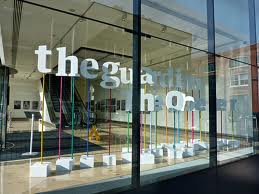

By “free press” I mean not the plutocratic oligarchy (absent the Guardian and Observer-owning Scott Trust) that maintains a diminishing stranglehold over printed national news, but that other sense of free – “free of charge”. The internet, with Google algorithms in the vanguard, is slowly, inexorably, doing what no politician could ever do: it is breaking down the cartel.
No qualitative judgement is made or implied about this being a Good Thing for the advancement of civilised values. Indeed, on balance, it may well be a bad thing. Just as there is no such thing as a free lunch, so there is no such thing as free journalism. If we are all able, in a matter of moments, to find out what is going on by tapping a few words into a search box at virtually no cost who, exactly, is going to pay for the many hours of sweat, journalistic nous and training that went into crafting the news item in the first place?
It’s a conundrum that digital content strategists frequently explain away by reference to the woolly wisdom of “creative destruction”. Darwinian metaphor is highly misleading, however. Paper dinosaurs may well be on their way to destruction. But there is nothing inevitable about the evolution of a genus of fleet-footed digital mammals to take their place.
The ways of evolution are multiform, mysterious and rarely linear. While it is entirely understandable that legacy media institutions should present themselves as the natural guarantors of smooth transition, the reality (with the possible exception of such venerable specialist titles as the Financial Times and Wall Street Journal) may well be very different. More likely there will be a period of chaotic evolutionary stasis before something commercially semi-vertebrate emerges anew from the economic goo.


Guardian print circulation may be in freefall, but its trend is by no means atypical. The Sun on Sunday is down nearly five per cent month on month, representing a 41 per cent collapse since Rupert Murdoch phoenixed it last year out of the ashes of The News of The World. The Sunday Express has now descended below 500,000, The Mirror is barely achieving one million, The Sun itself, not so long ago hovering around the three million mark, is now gliding towards two million.
Only the i – a scarcely economic 20p news digest – managed an increase, and that a miserly 1.45 per cent to just shy of 300,000. Those with a head for historical statistics might like to note that its host, The Independent, now boasts a circulation of no more than 75,000. Even The Sunday Times – psychological barrier for long one million – is now drifting down to 875,000.
In light of this dismal picture, it is no surprise to find The Sunday Telegraph (February ABC: 429,346) huddling closer to The Daily Telegraph (541,036) for warmth. As with the Sun, Mirror and The Independent seven-day operations that have preceded it, the rhetoric of the Telegraph’s transformation is radical and upbeat. The grim reality – and ultimate rationale for the move – is jobs lost. And with them, irreplaceable experience.


No matter how many time he incants the mantra “digital business”, MacLennan is unlikely – any more than his rivals who have trodden the same primrose path – to extricate his titles from the financial doldrums. The damage to the brand – particularly the Sunday brand – with its more considered, investigative magazine-like approach – is likely to be considerable. The strategic upside, after an initial financial up-tick, on the other hand is doubtful. Expect to see more circulation decline once disappointed Sunday readers reject the graft.
On the face of it, digital global readers, in whose name all this 7-day stuff is being done, look a worthy prize. For a start, there are lots of them. In January, for example, The Telegraph’s website traffic (by no means the most voluminous among newspaper brands) grew 11 per cent over the previous month to 3,129,599 – the sort of circulation figure that no UK newspaper has been able to boast of for a very long time. But it’s fool’s gold.
Digital readers are fickle and rather more likely to be driven by search than brand loyalty. Advertisers have recognised this by tightening their wallets. As former Google CEO Eric Schmidt long ago observed, there’s no better way of turning advertising dollars into cents than migrating to digital publishing. Nor, for the aforementioned reason of declining brand loyalty, are paywalls a viable financial alternative. Unlike the customers of banks, digital readers do have a choice. And they’re using it.
On the other hand, senior newspaper management cannot be seen to be doing nothing. They must inject energy and excitement into a task which, increasingly, looks as suicidal as the rush of the Gadarene swine.
How long before The Observer and Guardian – estimated to be losing about £50m a year – follow the same headlong path?
This post first appeared on Stuart Smith’s blog The Politics of Marketing.








